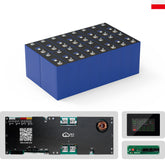Verwendung einer Autobatterie für einen Trolling-Motor erklärt
In der Welt der kleinen Boote und Angelabenteuer fragen sich viele: Kann man eine Autobatterie für seinen Trolling-Motor verwenden? In diesem umfassenden Leitfaden gehen wir detailliert auf die Vor- und Nachteile, Risiken und bewährten Vorgehensweisen ein. Die Verwendung einer Autobatterie für einen Trolling-Motor mag günstig und praktisch erscheinen, aber es gibt wichtige Faktoren zu beachten, um Schäden an der Ausrüstung oder eine Strandung auf dem Wasser zu vermeiden. Lesen Sie weiter, wir erklären Ihnen alles Wissenswerte zu diesem Thema.
- Warum ist die Verwendung einer Autobatterie für einen Trolling-Motor so interessant?
- Hauptunterschiede zwischen einer Autobatterie und einer Deep-Cycle-Batterie
- Können Sie eine Autobatterie für einen Trolling-Motor verwenden? Vor- und Nachteile
- Grundlegendes zu Batteriebewertungen bei der Auswahl einer Autobatterie für einen Trolling-Motor
- Bewährte Vorgehensweisen bei der Verwendung einer Autobatterie für einen Trolling-Motor
- Wann die Verwendung einer Autobatterie für einen Trolling-Motor sinnvoll ist
- Wann Sie keine Autobatterie für einen Trolling-Motor verwenden sollten
- Die Wahl der richtigen Autobatterie für einen Trolling-Motor, wenn Sie müssen
- So wechseln Sie von einer Autobatterie zu einer richtigen Schiffsbatterie
- Wartung einer für einen Trolling-Motor verwendeten Autobatterie
- Abschließende Gedanken zur Verwendung einer Autobatterie für einen Trolling-Motor
- Ist eine Autobatterie das Richtige für Ihren Trolling-Motor?
Warum ist es interessant, eine Autobatterie für einen Trolling-Motor zu verwenden?
Wenn Bootsfahrer und Angler zunächst nach einer Stromquelle für ihren Trolling-Motor suchen, ist die Autobatterie ein naheliegender Kandidat. Viele haben bereits Ersatz -Autobatterien oder können eine zu geringeren Kosten als eine Deep-Cycle-Schiffsbatterie bekommen.
Der Komfortfaktor
Eine Autobatterie ist leicht zu finden und relativ günstig. Da die meisten Autobesitzer ihre Batterie alle paar Jahre austauschen, bleibt oft eine gebrauchte, aber noch funktionierende Autobatterie übrig.
Der Kostenvorteil
Marine-Deep-Cycle-Batterien können teuer sein. Im Vergleich dazu scheint die Wiederverwendung einer Autobatterie für einen Trolling-Motor eine kostengünstige Alternative zu sein.
Die Neugier der Heimwerker
Wer gerne selbst Hand anlegt, experimentiert oft mit der Verwendung einer Autobatterie für einen Schleppmotor, insbesondere für kurze oder leichte Fahrten.
Hauptunterschiede zwischen einer Autobatterie und einer Deep-Cycle-Batterie
Bevor Sie eine Autobatterie für einen Schleppmotor verwenden, müssen Sie unbedingt verstehen, wie sie sich von einer richtigen Schiffsbatterie unterscheidet.
Zweck und Design
Autobatterie : Sie ist dafür ausgelegt, für kurze Zeit (zum Starten des Motors) einen großen Stromstoß abzugeben und dann über die Lichtmaschine weiter aufzuladen.
Deep-Cycle-Batterie : Konstruiert, um über einen längeren Zeitraum einen gleichmäßigen Stromfluss bereitzustellen, und für viele Tiefentladungen und Wiederaufladungen ausgelegt.
Interne Konstruktion
Eine Autobatterie verfügt über dünne Bleiplatten, die die Oberfläche für schnelle Energiestöße maximieren. Im Gegensatz dazu verfügt eine Deep-Cycle-Batterie über dickere Platten für eine lang anhaltende Energieabgabe.
Zykluslebensdauer
Autobatterie : Verträgt eine flache Entladung, verschlechtert sich jedoch schnell, wenn sie häufig tief entladen wird.
Deep-Cycle-Batterie : Speziell für Tiefentladungen und eine längere Lebensdauer entwickelt.
>>Siehe auch Häufige Fragen zum Laden einer 12-Volt-Batterie in einem Prius
Kann man eine Autobatterie für einen Trolling-Motor verwenden? Vor- und Nachteile
Vorteile der Verwendung einer Autobatterie für einen Trolling-Motor
Verfügbarkeit : Viele Menschen haben Zugang zu einer Ersatz -Autobatterie .
Kosteneinsparungen : Sie müssen nicht sofort in eine neue Schiffsbatterie investieren.
Praktisch für Kurztrips : Wenn Ihr Ausflug kurz ist und wenig Strom verbraucht wird, kann eine Autobatterie ausreichen.
Nachteile der Verwendung einer Autobatterie für einen Trolling-Motor
Begrenzte Batterielebensdauer : Die Verwendung einer Autobatterie für diesen Zweck verkürzt ihre Lebensdauer drastisch.
Gefahr, liegen zu bleiben : Eine tiefentladene Autobatterie kann unerwartet ausfallen und Sie liegen lassen.
Nicht für diese Aufgabe ausgelegt : Das Entladungsprofil einer Autobatterie ist nicht für Trolling-Motoren geeignet.
Mögliche Schäden am Trolling-Motor : Eine inkonsistente Spannungsversorgung kann zu Problemen mit der Motorleistung führen.
Grundlegendes zu Batteriebewertungen bei der Auswahl einer Autobatterie für einen Trolling-Motor
Wenn Sie dennoch erwägen, eine Autobatterie für Ihren Trolling-Motor zu verwenden, achten Sie auf die folgenden Batteriewerte:
Kaltstartstrom (CCA)
CCA gibt an, wie gut die Autobatterie einen Motor bei kalten Temperaturen startet – irrelevant für den Betrieb eines Schleppmotors.
Reservekapazität (RC)
RC gibt an, wie lange die Batterie 25 Ampere liefern kann, bevor die Spannung unter 10,5 Volt fällt. Für Trolling-Motoren ist ein höherer RC besser.
Amperestunden (Ah)
Die Ah-Zahl gibt an, wie lange die Batterie einen bestimmten Strom liefern kann. Autobatterien haben zwar im Allgemeinen eine niedrigere Ah-Zahl als Deep-Cycle-Batterien, für den Einsatz in einem Trolling-Motor ist diese Zahl jedoch am wichtigsten.
Bewährte Vorgehensweisen bei der Verwendung einer Autobatterie für einen Trolling-Motor
Wenn Sie für einen Trolling-Motor eine Autobatterie verwenden müssen, befolgen Sie diese bewährten Vorgehensweisen, um das Risiko zu minimieren und die Batterielebensdauer zu verlängern.
Entladetiefe begrenzen
Versuchen Sie, die Autobatterie nicht unter 50 % Ladezustand zu entladen. Verwenden Sie einen Batteriemonitor oder ein Voltmeter, um die Spannung zu überwachen.
Nur Kurztrips
Planen Sie Ihre Ausflüge so, dass sie nicht länger als ein paar Stunden dauern. Die Autobatterie ist für den Dauereinsatz in diesem Anwendungsbereich einfach nicht ausgelegt.
Häufiges Aufladen
Laden Sie die Autobatterie nach Gebrauch sofort wieder auf. Ein tiefentladener Zustand führt zu Sulfatierung und dauerhaftem Kapazitätsverlust.
Behalten Sie die Spannung im Auge
Wenn Ihr Trolling-Motor an Leistung verliert oder die Batteriespannung unter Last unter 11 Volt fällt, stellen Sie die Verwendung ein, um dauerhafte Schäden zu vermeiden.
Wann die Verwendung einer Autobatterie für einen Trolling-Motor sinnvoll ist
Gelegentliche Verwendung
Wenn Sie einen Trolling-Motor selten und für kurze Fahrten verwenden, kann eine Autobatterie eine vorübergehende Lösung sein.
Testen oder Sichern
Eine Autobatterie eignet sich gut als vorübergehende Sicherung oder zum Testen der Konfiguration Ihres Trolling-Motors.
Budgetbeschränkungen
Wenn die finanziellen Mittel begrenzt sind und Sie gerade erst anfangen, ist die Verwendung einer vorhandenen Autobatterie besser, als gar nicht mit dem Boot zu fahren – Sie sollten sich nur der Einschränkungen bewusst sein.
Wann Sie keine Autobatterie für einen Trolling-Motor verwenden sollten
Lange Angeltouren
Vermeiden Sie die Verwendung einer Autobatterie, wenn Sie den ganzen Tag auf dem Wasser verbringen möchten.
Hochleistungs-Trolling-Motoren
Wenn Ihr Schleppmotor für eine Schubkraft von 55 lbs oder mehr ausgelegt ist, zieht er zu viel Strom, als dass eine Autobatterie ihn effektiv bewältigen könnte.
Entfernte Standorte
Verlassen Sie sich beim Bootfahren in abgelegenen Gebieten nicht auf eine Autobatterie, da ein Batterieausfall dazu führen könnte, dass Sie stranden.
Die Wahl der richtigen Autobatterie für einen Trolling-Motor, wenn Sie müssen
Wenn Sie sich für die Verwendung einer Autobatterie entscheiden, wählen Sie mit Bedacht:
Bevorzugen Sie Autobatterien mit höherer Kapazität (höhere RC- und Ah-Werte).
Verwenden Sie neuere Batterien in gutem Zustand.
Vermeiden Sie alte oder abgenutzte Autobatterien mit verminderter Leistung.
So wechseln Sie von einer Autobatterie zu einer richtigen Schiffsbatterie
Eine Autobatterie reicht zwar für den Anfang aus, langfristig ist jedoch der Umstieg auf eine Deep-Cycle-Schiffsbatterie die beste Lösung.
Vorteile von Deep-Cycle-Schiffsbatterien
Entwickelt für Schleppmotorlasten.
Längere Lebensdauer unter Tiefentladungsbedingungen.
Konstante Leistung über den gesamten Ladezyklus.
Empfohlene Batterietypen
AGM (Absorbent Glass Mat) Batterien: Wartungsfrei, langlebig.
Lithium-Eisenphosphat (LiFePO4): Leichtgewichtig, sehr lange Lebensdauer (am besten für ernsthafte Benutzer).
Tipps zum Upgrade
Bewerten Sie Ihr typisches Nutzungsmuster und wählen Sie eine geeignete Ah-Bewertung.
Investieren Sie in ein intelligentes Ladegerät, das für Ihren neuen Batterietyp geeignet ist.
Entsorgen Sie Ihre alte Autobatterie ordnungsgemäß über ein Recyclingprogramm.
>>Siehe auch Kompletter Leitfaden zu Hoverboard-Lithiumbatterien – Komplettlösung
Wartung einer für einen Trolling-Motor verwendeten Autobatterie
Wenn Sie weiterhin eine Autobatterie verwenden, ist die ordnungsgemäße Wartung von entscheidender Bedeutung.
Regelmäßiges Laden
Laden Sie die Autobatterie nach jedem Gebrauch immer vollständig auf.
Spannungsüberwachung
Überwachen Sie die Batteriespannung vor, während und nach Ausflügen.
Reinigung und Inspektion
Reinigen Sie die Batteriepole regelmäßig und prüfen Sie sie auf Anzeichen von Korrosion oder Schwellung.
Lagerung
Bewahren Sie die Autobatterie an einem kühlen, trockenen Ort auf und halten Sie sie bei Nichtgebrauch vollständig geladen.
Abschließende Gedanken zur Verwendung einer Autobatterie für einen Trolling-Motor
Zusammenfassend lässt sich sagen, dass die Verwendung einer Autobatterie für einen Trolling-Motor zwar möglich ist, aber mit Kompromissen und Risiken verbunden ist. Eine Autobatterie ist nicht die ideale Stromquelle für Trolling-Motoren und sollte nur für kurze Fahrten, gelegentliche Ausflüge oder als Backup verwendet werden.
Wenn Sie zuverlässige Leistung und längere Fahrten wünschen, ist die Investition in eine geeignete Deep-Cycle-Schiffsbatterie die kluge Wahl. Für Einsteiger und Experimentierer kann eine gut gewartete Autobatterie jedoch helfen, ohne große Kosten aufs Wasser zu kommen.
Ist eine Autobatterie das Richtige für Ihren Trolling-Motor?
Die Verwendung einer Autobatterie für einen Trolling-Motor ist eine praktikable kurzfristige Lösung mit klaren Einschränkungen. Machen Sie sich mit den Risiken vertraut, befolgen Sie bewährte Verfahren und ziehen Sie ein Upgrade auf eine Deep-Cycle-Batterie in Betracht, sobald Ihr Budget es zulässt. Egal, ob Sie in ruhigen Gewässern angeln oder Ihr Boot testen, legen Sie immer Wert auf Sicherheit und Batteriewartung, um Probleme auf dem Wasser zu vermeiden.
Denken Sie bei der effektiven Stromversorgung Ihres Trolling-Motors daran, dass eine Autobatterie zwar funktionieren kann, die richtige Batterie Ihr Bootserlebnis jedoch verändern kann.
























Leave a comment
All blog comments are checked prior to publishing